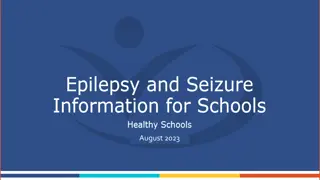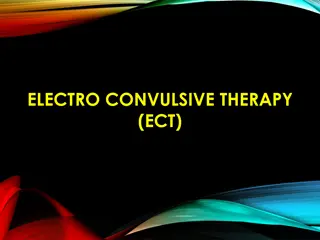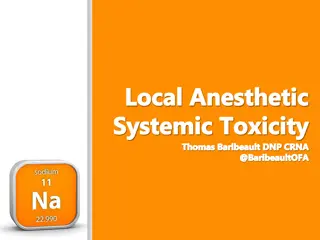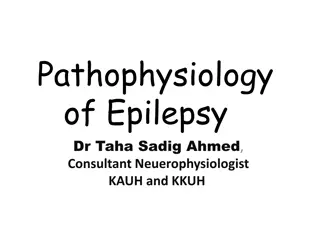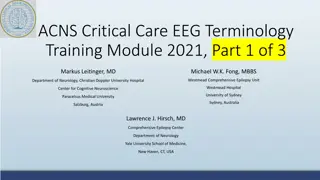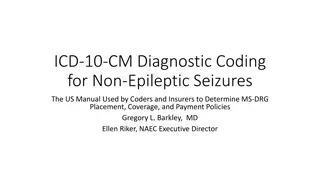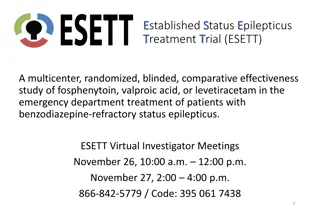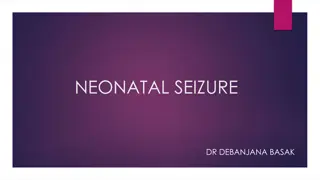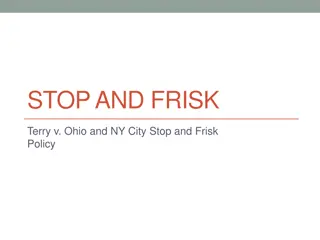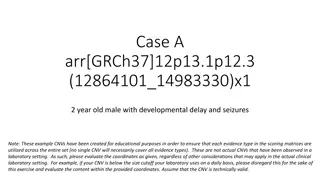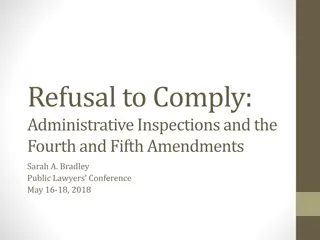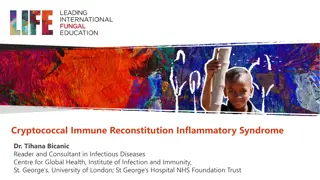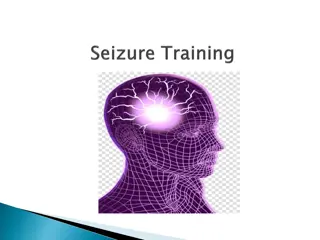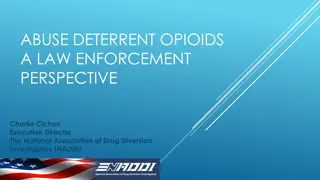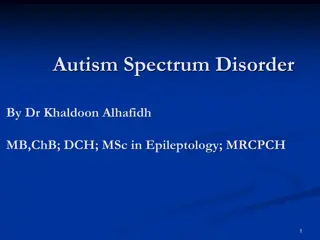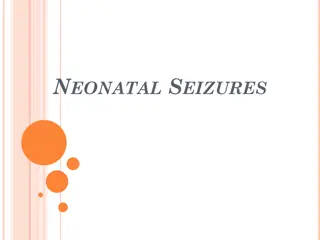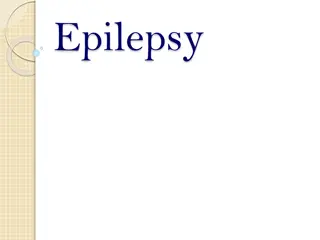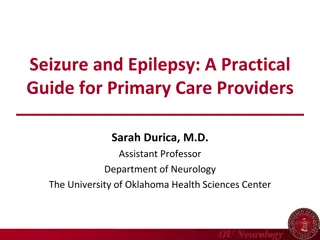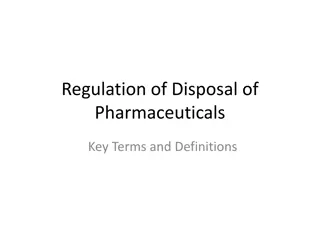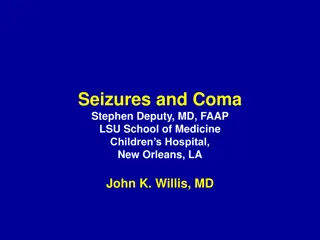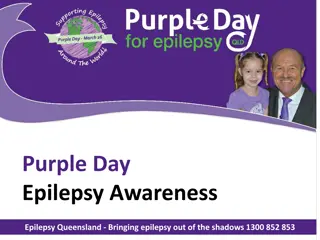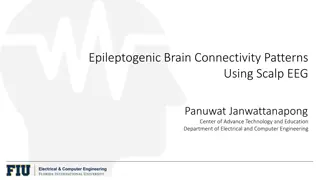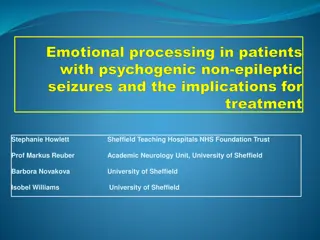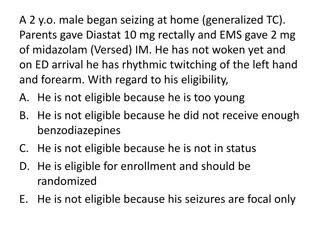Understanding Angelman Syndrome - Enhancing Lives Through Awareness
Angelman syndrome is a rare genetic condition impacting physical milestones and learning abilities. It affects around 1 in 15,000 individuals globally, with symptoms including speech difficulties, disrupted sleep, and seizures. Though there is no cure, increased awareness and research provide hope f
3 views • 20 slides
Buy Rivotril Clonazepam Tablet - silkroadblackpharmacy.com
Buy Rivotril Clonazepam Tablet and consume the same in case of panic attacks. Do buy clonazepam but use it only as per the doctor\u2019s prescription you are consulting.\n\nUses \u2013 Controls and prevents seizures\nSide effects \u2013 Increased saliva production, tiredness\nFind clonazepam for sal
1 views • 7 slides
Understanding Seizures and Epilepsy: A Comprehensive Guide
Explore the world of seizures and epilepsy to enhance your knowledge and learn how to provide optimal support for individuals with epilepsy. Discover the basics of seizures, signs to watch out for, the difference between seizures and epilepsy, and common causes of seizures. Empower yourself with ess
3 views • 21 slides
Illegally obtained evidence
Illegally obtained evidence refers to evidence acquired through unlawful means, such as searches without warrants or extraction under duress. The Fruit of the Poisonous Tree doctrine renders evidence inadmissible if derived from illegally obtained evidence. The Exclusionary Rule prohibits the use of
2 views • 30 slides
Enhancing Law Enforcement with LEAP Programme in Cape Town
The Law Enforcement Advancement Programme (LEAP) aims to stabilize crime hotspots in Cape Town and ensure residents' safety. LEAP grants powers such as warrantless arrests, article seizures, and demanding identification. Municipal law enforcement officers have limited powers regarding specific offen
3 views • 35 slides
Legal Challenges in GST Enforcement
Explore the legal framework and challenges in GST enforcement through searches, seizures of cash, summonses, and arrests. Get insights into key court cases and constitutional challenges affecting the enforcement process.
5 views • 10 slides
neurosurgeon in jaipur-Dr Himanshu Gupta
brain tumor is an abnormal growth of cells in the brain. Tumors can be either cancerous (malignant) or non-cancerous (benign). Cancerous tumors grow and spread aggressively, potentially invading nearby tissues and spreading to other parts of the body, while non-cancerous tumors are usually less aggr
0 views • 5 slides
Understanding Electroconvulsive Therapy (ECT) for Psychiatric Treatment
Electroconvulsive Therapy (ECT), also known as electroshock, is a psychiatric treatment that induces seizures in anesthetized patients for therapeutic purposes. ECT has a controversial history but is well-established in the medical field. Introduced in 1938, ECT has replaced older treatments like in
1 views • 17 slides
Understanding Local Anesthetic Systemic Toxicity in Anesthesia Practice
Local anesthetics are crucial in anesthesia for their ability to prevent nerve depolarization, but systemic toxicity can lead to serious complications. Last Causes, signs, and max dosage discussion along with the importance of recognizing early signs like lightheadedness, tinnitus, and late symptoms
0 views • 19 slides
Understanding the Pathophysiology of Epilepsy and Seizures
Epilepsy is a group of disorders characterized by recurrent, unprovoked seizures. Seizures are sudden surges of electrical activity in the brain that can cause alterations in sensation, behavior, or consciousness. They can be classified as partial or generalized based on their origin and clinical ma
2 views • 14 slides
Understanding ACNS Critical Care EEG Terminology 2021: Part 1 of 3
This module provides an introduction to the important components of the ACNS standardized critical care EEG terminology for 2021. It discusses common terms and components of EEG background, sporadic epileptiform discharges, rhythmic and periodic patterns (RPPs), electrographic and electroclinical se
1 views • 41 slides
Understanding ICD-10-CM Coding for Seizure Disorders: A Comprehensive Guide
ICD-10-CM codes play a crucial role in diagnosing and managing seizure disorders, including epilepsy and non-epileptic seizures. This detailed guide covers the coding guidelines for various types of seizures, such as intractable epilepsy and conversion disorder with seizures. It also explains how th
0 views • 6 slides
Understanding Epilepsy and Driving: What Parents Need to Know
People living with epilepsy face challenges regarding driving, as seizures can pose a serious risk. Laws and regulations vary by state, requiring individuals to be seizure-free for a specific period. Teenagers with epilepsy may desire independence through driving, prompting discussions on seizure ma
1 views • 20 slides
Comparative Effectiveness Study of Fosphenytoin, Valproic Acid, and Levetiracetam in Status Epilepticus Treatment
The ESETT study is a comparative effectiveness trial evaluating fosphenytoin, valproic acid, and levetiracetam in treating benzodiazepine-refractory status epilepticus. The goal is to determine the most effective among these agents while assessing safety outcomes. Inclusion criteria focus on patient
0 views • 48 slides
Trends in New Psychoactive Substances Seizures and Use
Seizures of both plant-based and synthetic New Psychoactive Substances (NPS) declined in 2018, along with a decrease in global seizures of khat and fluctuations in the use of NPS. Legislation on substances like mephedrone led to a decline in their use, while the use of ketamine increased. NPS use va
0 views • 8 slides
Understanding Your Rights Under the Fourth Amendment
Exploring the rights to privacy granted by the Fourth Amendment, this lesson delves into scenarios involving searches and seizures in various settings like schools, cars, and homes. Students will learn how these rights apply differently depending on the location and items being searched.
0 views • 19 slides
Understanding Neonatal Seizures and Their Pathophysiology
Neonatal seizures are sudden changes in neurologic function of a newborn, involving motor, behavior, and autonomic functions. The pathophysiology includes delays in Na/K ATPase maturation, increased receptor density, and GABAergic transmission. Different types of seizures like subtle, clonic, tonic,
1 views • 24 slides
Understanding Poisonous Plants and Their Effects on Humans
Poisonous plants can have deleterious effects on individuals, leading to severe consequences and even death if not managed properly. These plants produce toxins that interfere with the body's essential functions, ultimately causing impairment and potential fatality. Recognizing the grades of poisoni
0 views • 11 slides
Understanding Stop and Frisk Policies: Terry v. Ohio and NY City Practices
Stop and frisk procedures, exemplified in the Terry v. Ohio case, allow law enforcement to conduct brief searches for weapons when there is reasonable suspicion of criminal activity. This concept ties back to the 4th Amendment's protection against unreasonable searches and seizures. The Supreme Cour
0 views • 13 slides
Understanding Anticonvulsant Drugs in Pharmaceutical Chemistry
Anticonvulsant drugs play a crucial role in managing epilepsy, a common neurological disorder characterized by recurrent seizures. This article discusses the classification of epileptic seizures, mechanisms of action of anticonvulsants, and the role of GABA A receptors as targets for anticonvulsant
0 views • 27 slides
Comprehensive Assessment of a Pathogenic CNV in a 2-Year-Old Male with Developmental Delay and Seizures
In this case study, a 2-year-old male presenting with developmental delay and seizures was evaluated for a CNV at the 12p13.1p12.3 region. The CNV was found to overlap with the GRIN2B gene, a known haploinsufficient gene associated with developmental disorders. Despite potential additional scoring c
0 views • 17 slides
Constitutional Rights in Administrative Inspections: Refusal to Comply
This content discusses the Fourth and Fifth Amendments in the context of administrative inspections, emphasizing the protection of individuals against unreasonable searches and seizures. It covers the incorporation by the Fourteenth Amendment and key legal cases related to privacy rights and due pro
0 views • 68 slides
Understanding the Fourth Amendment: Search and Seizure Laws in the United States
The Fourth Amendment of the United States Constitution protects individuals from unreasonable searches and seizures by the government. It outlines the requirements for obtaining a search warrant, defines a reasonable expectation of privacy, and details the types of searches allowed without a warrant
0 views • 18 slides
Understanding Cryptococcal Immune Reconstitution Inflammatory Syndrome
Cryptococcal Immune Reconstitution Inflammatory Syndrome (C-IRIS) is a condition where rapid reversal of immunodeficiency triggers exaggerated inflammatory reactions in response to Cryptococcus antigens. It can manifest as either Unmasking IRIS or Paradoxical IRIS, with common CNS presentations incl
0 views • 10 slides
Understanding Magnesium Metabolism and Hypomagnesaemia
Magnesium, mainly an intracellular ion, plays a crucial role in enzyme function and cell membrane stability. Its renal handling involves filtration and reabsorption, with hypomagnesaemia often linked to hypocalcaemia. Causes include inadequate intake, excessive losses from GI and urinary sources, an
0 views • 17 slides
Understanding Seizure Disorders and First Aid
Seizure disorders can have varying symptoms and may occur at any time in life. Immediate medical treatment is crucial for the first seizure. Factors like stress, illness, temperature changes, and photosensitivity can impact seizure thresholds. Different types of seizures, including focal aware tonic
0 views • 17 slides
Opioid Abuse Deterrent Strategies: Law Enforcement Insights
The National Association of Drug Diversion Investigators (NADDI) focuses on combating prescription drug diversion through advocacy, training, and collaboration with law enforcement. They address the misuse of opioids like OxyContin and Oxycodone, showing successes in reducing diversion and deaths in
0 views • 14 slides
Understanding Autism Spectrum Disorder: Overview, Characteristics, and Treatment
Autism Spectrum Disorder, a complex neurodevelopmental condition, presents challenges in social interaction, communication, and behavior. Individuals with autism may exhibit impaired social interactions, speech and language disorders, repetitive behaviors, and co-morbid conditions like learning diff
0 views • 25 slides
Understanding Neonatal Seizures and Differentiating from Jitteriness
Neonatal seizures are a critical sign of neurologic dysfunction in newborns, with various types such as subtle, clonic, tonic, spasms, and myoclonic seizures. The immature brain's excitability and differences from the mature brain predispose neonates to seizures. Generalized clonic seizures are rare
0 views • 17 slides
Understanding Epilepsy: Causes, Symptoms, and Classification
Epilepsy is a medical disorder characterized by recurrent, unprovoked seizures. Seizures are sudden alterations in perception or behavior caused by abnormal neuronal activity. The incidence of epilepsy is high in early childhood, declines, plateaus, and then rises among the elderly. Seizures can be
0 views • 41 slides
Understanding Seizures and Epilepsy: A Practical Guide for Primary Care Providers
This practical guide provides valuable insights into seizures and epilepsy for primary care providers, covering topics such as different seizure types, epilepsy definition and treatment initiation, antiseizure medications, and status epilepticus management. Terminology and a clinical scenario are di
0 views • 53 slides
Regulations and Disposal of Pharmaceuticals Key Terms
Understanding the regulations around the disposal of pharmaceuticals is crucial to protect the environment and ensure safe practices. Unwanted pharmaceuticals should not be disposed of with regular trash or flushed as they can affect water resources. Incineration, governed by federal Clean Air Act r
0 views • 7 slides
Hazards of LED Products: Health Impacts & Lack of Regulations
This content explores the adverse health impacts of LED visible radiation, including neurological, optical, and circadian rhythm effects. Personal stories of harm from LED exposure are shared, highlighting seizures, migraines, anxiety, and other debilitating conditions. The lack of regulations surro
0 views • 9 slides
Understanding Seizures and Coma: A Comprehensive Overview
This informational content delves into various aspects of seizures and comas, covering topics such as the prevalence of seizures, classification of epilepsy, EEG in epilepsy, seizure history, and different types of seizures like simple partial and complex partial seizures. It provides insights into
0 views • 69 slides
The Impact of School Nurses on Mental Health and Academic Outcomes
School nurses play a crucial role in supporting students' mental health, addressing physical and emotional needs, and creating a safe and supportive school environment. They assess and intervene in various situations, from stress-related seizures to abuse cases, and contribute to improved academic p
0 views • 12 slides
Understanding Epilepsy: Information and Awareness
Epilepsy is a condition characterized by seizures, which can manifest in various ways. It often creates concerns for children at school, but knowing how to respond and provide support is crucial. March is Epilepsy Awareness Month, and Purple Day on 26th March aims to bring epilepsy out of the shadow
0 views • 8 slides
Uncovering Epileptogenic Brain Connectivity Patterns Through Scalp EEG
Epilepsy is a common neurological disorder characterized by unprovoked seizures, affecting a significant portion of the population. Enhancing the diagnosis and prediction of seizures through EEG recordings can improve therapeutic strategies for epilepsy patients. Functional connectivity analysis in
0 views • 21 slides
Understanding Psychogenic Non-epileptic Seizures: A Comprehensive Overview
Sheffield Teaching Hospitals NHS Foundation Trust offers a specialist neurology psychotherapy service for patients with functional neurological symptoms. The service, established in 2003, provides brief psychotherapy sessions to patients referred by consultant neurologists. The approach includes stu
0 views • 18 slides
Pediatric Seizure Management Eligibility Criteria in the Emergency Department
A series of scenarios involving pediatric patients experiencing seizures at home or upon arrival in the Emergency Department are presented. Each case outlines the administration of benzodiazepines, the timing of seizures, and the patient's eligibility for enrollment in a randomized study based on sp
0 views • 9 slides
Understanding Seizure Disorders in Children: Causes, Types, and Response
Seizure disorders in children can be caused by various factors such as brain development issues, brain injuries, infections, and more. Triggers like stress, lack of sleep, and certain lifestyle habits can lead to seizures. There are different types of seizures, including tonic-clonic, absence, myocl
0 views • 20 slides


